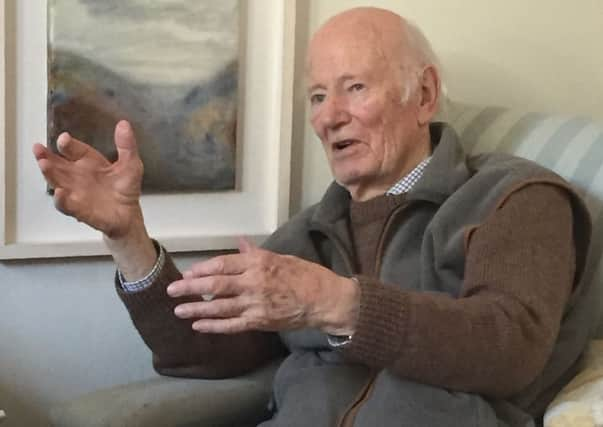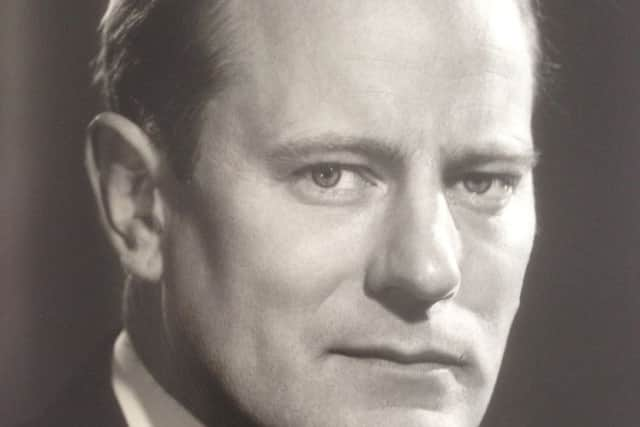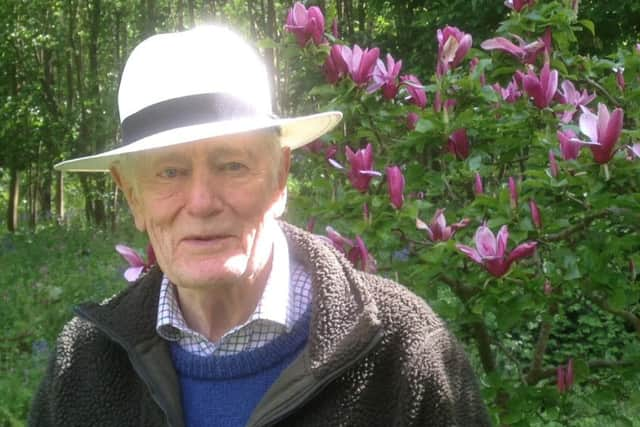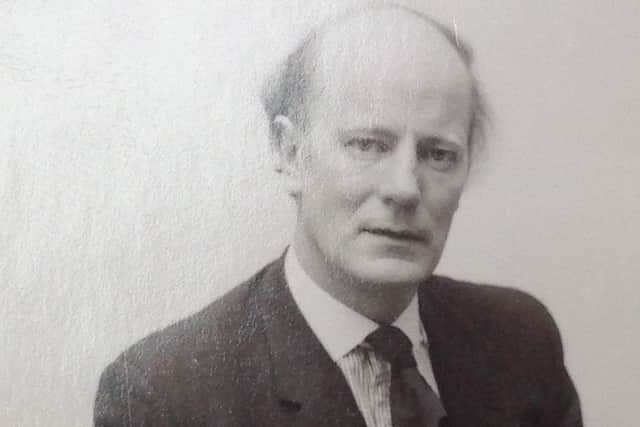Obituary: Robin Chichester-Clark '“ Unionist MP who was an early critic of Paisley


He was the younger son of Captain James Chichester-Clark, RN, DSO (MP for South Londonderry from 1929 until his death in 1933) and Marion (nee Chichester) of Moyola Park, Castledawson, Co Londonderry.
His older brother, James, was to become the last but one Prime Minister of Northern Ireland.
Advertisement
Hide AdAdvertisement
Hide AdHis younger sister, Penelope Hobhouse, is a well-known historian of garden design.


His childhood was spent at Moyola (Robin’s mother having remarried following the death of his father).
Moyola had been acquired by his Dawson ancestors (developers of much of central Dublin, including Dawson Street) in the seventeenth century.
He grew up largely under the care of his maternal grandmother Dame Dehra Parker, a unionist member at Stormont and the only woman to hold office in the government of Northern Ireland between 1921 and 1972 (as Minister for Health and Local Government); her first husband, Robert Chichester, had also been an MP.
Advertisement
Hide AdAdvertisement
Hide AdHer influence was important in shaping Robin’s life; Dame Dehra was interested in the arts as well as politics and Robin was to divide his life between culture and public affairs.


Politics had a long family ancestry. His Chichester ancestors included a Lord Deputy of Ireland.
Another forebear, George Dawson, was the brother-in-law of Sir Robert Peel, the Prime Minister, and himself held office in Tory administrations in the 1820s and 1830s.
At thirteen Robin went to the Royal Naval College, Dartmouth. His father had served in the Royal Navy and Dame Dehra’s second husband was a retired Vice-Admiral and (on both the Chichester and the Clark sides of his family) Robin’s forebears had something of a military and naval tradition. But life in the Royal Navy did not appeal to him and he left without entering the senior service.
Advertisement
Hide AdAdvertisement
Hide AdHe once remarked that Benjamin Britten’s opera Owen Wingrave (in which a young man rejects the military life his family want him to embrace) had a special meaning for him.


Instead Robin went to Magdalene College, Cambridge where he read history and law.
A short period of non-political employment followed. After working briefly as a journalist he worked in public relations for John Christie, the founder of Glyndebourne Opera from 1952 to 1953; he was then for two years the assistant to the Sales Manager at Oxford University Press. For someone who was as interested in books and music as Robin was both jobs were suitable.
He also helped to fund from his own means the first opera production involving the future Sir Colin Davis.
Advertisement
Hide AdAdvertisement
Hide AdHowever, public life soon called and in 1955 he was elected Member of Parliament at Westminster for Londonderry City and County in that year’s general election. He was the youngest new MP but one.


He was deeply depressed by the Suez crisis of the following year. Nevertheless he accepted office in the new administration of Harold Macmillan in the Whips’ Office, serving there until the end of Sir Alec Douglas-Home’s premiership in 1964; he rose in the Whips’ office to Comptroller of HM Household, a position he held from 1961 to 1964.
The then Chief Whip, Edward Heath, was a friend – Robin drove him round Ulster in 1959; and Heath’s brand of pro-European Conservatism was one Robin was to espouse for the rest of his life.
The unionists at Westminster were effectively a wing of the Conservative Party and its members were in general of the same type as most of their English or Scottish counterparts: they were often educated at independent schools, and were graduates and professional men for the most part.
Advertisement
Hide AdAdvertisement
Hide AdBoth in government and in opposition ( after 1964 ) Robin was close to the political centre. It was he who suggested to Iain MacLeod (later, briefly, Chancellor of the Exchequer) that the famous description of President Kennedy as an idealist without illusions might be inverted to fit Harold Wilson; it wasn’t long before MacLeod rose in the House to describe the Labour Prime Minister as an illusionist without ideals.
During his party’s period in opposition Robin served on the front bench; he was for a time spokesman on the arts as well as on Northern Ireland. He also became a husband and a father marrying Jane Goddard, daughter of Air Marshal Sir Robert Goddard, in 1953; they were to have one son and two daughters.
In his later years in opposition Ulster affairs came to preoccupy him. He believed he was the first Unionist MP to criticise Ian Paisley, doing so at a Twelfth field in 1966. Chairing a meeting at Glengall Street during the general election of that year he suggested that the party should do more to confront the threat posed by Ian Paisley.


The party’s general secretary, J.O. Baillie, told him not to worry. He was sure that Paisley would be certified within a year. The following years saw not Paisley’s departure for an asylum but his increasing influence. In 1969 Robin was briefly suspended from the Orange Order for attending the requiem mass for Colonel Conolly MacCausland MC, a distinguished Irish Guards officer and Catholic convert.
Advertisement
Hide AdAdvertisement
Hide AdThis incident (farcical according to Robin’s account) was an indication of the deepening tensions in Northern Ireland. Robin’s opposition to Paisley persisted though he was forced to deny a groundless rumour during the 1970 election that he had made a pact with the clergyman politician. But worse came in the late 1960s.
The disturbances at the October 1968 Civil Rights march in Londonderry led to a crisis in the administration at Stormont led by Terence O’Neill, Robin’s very distant cousin. Robin and his brother James, by then Minister of Agriculture in the Stormont cabinet, took the initiative.
On Armistice Sunday 1968 they drew up in the library at Moyola Park a list of the necessary reforms in housing, voting and local government; they then showed their proposals to O’Neill when he called at Moyola. It was to be left to James Chichester-Clark to bring his own (and Robin’s) ideas into fruition. In April 1969, James, having lost confidence in O’Neill, decided to resign from the cabinet. James Chichester-Clark had never been close to Terence O’Neill. Robin, however, had worked closely with the Prime Minister and had been his unofficial representative at Westminster; he undertook for O’Neill a number of confidential tasks – for example, sounding out the Labour MP Douglas Houghton about the Governorship of Northern Ireland and rescuing a Stormont minister from an embarrassing incident in London. O’Neill told Robin to persuade his brother not to resign; Robin declined.
James’s resignation led to O’Neill’s resignation.
Robin’s decision not to do what O’Neill asked resulted in the end of their once close friendship; thereafter they hardly ever spoke again to one another. The election of a new leader (confined to Stormont) resulted in James’s appointment as the fifth and the penultimate Prime Minister of Northern Ireland – he triumphed over Brian Faulkner by one vote.
Advertisement
Hide AdAdvertisement
Hide AdIt is often claimed that O’Neill colluded with James Chichester-Clark to secure the latter’s election; this version of events is groundless.
James Chichester-Clark’s elevation to the premiership posed problems for Robin’s own career. After being returned for Londonderry in 1970 he had hoped to become Minister for the Arts; government whips told him he was being considered as the Minister of State at the Board of Trade. In the event neither position came to him. Edward Heath decided that giving Robin a position in his administration might cause embarrassment if Stormont and Westminster were to quarrel.
Robin spent two years on the back benches-even after his brother’s resignation as Prime Minister and Unionist leader in March 1971. A year later, after Stormont had been prorogued, Robin was offered the position of Minister of State at the newly-established Northern Ireland Office under William Whitelaw; he declined the position fearing that he would be regarded as a traitor at home. Before the Parliament of Northern Ireland came to an end Robin – who at this point was Chairman of the Unionists at Westminster – had warned Brian Faulkner that direct rule was imminent; his warnings were ignored.
Later in 1972 Robin did return to office as Minister of State at the Department of Employment. The Troubles were worsening at home. He was deeply moved when he visited in hospital those who had ben injured in the Provisional IRA bomb in Claudy in 1972.
Advertisement
Hide AdAdvertisement
Hide AdWhen it became known that Whitelaw had met IRA leaders in London in the summer of 1972 Robin considered resignation; he was dissuaded from doing so by Whitelaw himself. But relations with his constituency party had become difficult; furthermore his first marriage had broken up under the strain of political life and he was divorced in 1972. Late in 1973 he announced that he would not stand again for Londonderry.
Heath offered him a peerage but he declined hoping that he might secure the nomination for a seat in England. His efforts proved unsuccessful and in 1974 Robin’s political career came to a premature end. He had entered politics early and was still (at 46) a relatively young man. At his death he was, along with Lord Carrington, one of the last survivors of Harold Macmillan’s administration.
He also remarried in 1974; his new wife was Caroline, a newly qualified barrister and the daughter of Anthony Bull, the former Vice-Chairman of London Transport. His new wife’s late grandfather, Sir William Bull MP had been a supporter of the Ulster Unionist Party and a close associate of Bonar Law, the Prime Minister. They had two sons.
A new career came to him. He worked in business as Director of an executive search company but he also became increasingly involved in charity. He was Chairman of RAFT, the reconstructive surgery charity from 1988 to 2000; he had helped to found RAFT with two plastic surgeons. He chaired the Arvon Foundation, a creative writing charity, from 1997 to 2001 and the Arvon Development Committee from 1997.
Advertisement
Hide AdAdvertisement
Hide AdThose two charities brought him into contact with Ted Hughes, the then Poet Laureate; it was Hughes’s wife Carol who asked him initially to set up the development committee to raise money for bursaries. Arvon brought him into close contact with other writers such as Seamus Heaney and P.D. (later Baroness) James.
Hughes, Heaney and James were all involved in fund-raising events for Arvon which Robin organised. Some of these events involved theatre and film stars such as Diana Rigg, Imogen Stubbs and Edward Fox. He was also a trustee of the Royal Philharmonic Orchestra and was closely involved with the House of Illustration which opened two years ago.
In the case of the last named charity he helped to start the process of fund raising. Two years ago he took a sympathetic interest in The Ulster Orchestra when it was going through a period of crisis; he used his political contacts in London to try to secure support for the orchestra.
Robin Chichester-Clark once remarked that he believed he had achieved more in his work for charity than in his life as a politician. However, his political career was hardly inconsequential. On the contrary he played an important part in reforming unionist rule in the late 1960s and early 1970s.
Advertisement
Hide AdAdvertisement
Hide AdBy the end of his brother’s premiership all of the original demands of the civil rights movement had been met. Robin was a support to James throughout his time in office. His brand of unionism was moderate and non-sectarian. He was always opposed to Ian Paisley and was one of that figure’s earliest and most determined critics. He was the last member for an Ulster constituency to hold government office in London and remained interested in his homeland to the end.
In appearance Robin Chichester-Clark was tall and distinguished. His ancestry was noble but he was far from aloof; in character he was genial and approachable, friendly and helpful; his charm was authentic, his manner gracious.
He inspired in his family and friends the deepest love, admiration and affection. He was devoted to public service whether in politics or philanthropy. He lived for most of his life in London but was a countryman by birth and he spent much time at a second home in rural Somerset; it is in a churchyard in that county that his remains will be laid to rest.
He was interested in animals and nature; it was hardly accidental that the two poets to whom he became most close, Ted Hughes and Seamus Heaney, shared his affinity with nature. He was interested also in art – he once expressed regret that a painting by John Luke that Dame Dehra owned was “not the sort of thing that comes to a younger son”.
Advertisement
Hide AdAdvertisement
Hide AdHe was devoted to music and loved to read. When he was asked what he thought of the work of Anthony Trollope he replied that he thought he had read 39 of his novels. (In other words, almost all).
Sir Robin Chichester-Clark died suddenly on holiday in Norfolk on August 5.
He is survived by his widow Caroline as well as by all five of his children. Emma is an author and illustrator; Mark is a singer, composer and Director of the Dovedale Arts Festival; Sophia owns and runs the Pangbourne House Montessori School; Adam practises at the Commercial Bar; and Tom is a composer and music producer.
C.D.C. Armstrong, the author of this obituary, is a visiting research associate in history at Queen’s University, Belfast